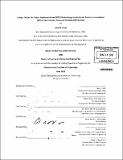Using a Design for Project Implementation (DFPI) methodology to accelerate Return on Investment (ROI) of an Enterprise Resource Planning (ERP) System
Author(s)
Chun, Julie M
DownloadFull printable version (17.49Mb)
Other Contributors
Leaders for Global Operations Program.
Advisor
Abbott Weiss and Donald Rosenfield.
Terms of use
Metadata
Show full item recordAbstract
Corporations continue to grapple with the dilemma of identifying, developing and managing the implementation of meaningful process improvement projects while simultaneously meeting business goals and customer needs. In this thesis we propose a methodology, dubbed Design for Project Implementation (DFPI) that integrates a change management model and engineering design and assessment tools to provide facts and data upon which to base decisions. We suggest that the methodology can be applied via a two-dimensional evaluation process that provides a means of balancing the needs of the business (via an impact to business perspective) and a means to accelerate return on investment (via an ease of project implementation perspective). We propose that the DFPI methodology can be applied in a bottoms-up approach to investigate the value proposition of a project, highlighting critical project elements and making specific recommendations to project leaders. We also suggest that a DFPI integrated business solution (design tools in conjunction with an interactive database) can be applied in a top-down approach, identifying high risk or high leverage areas to leadership sponsors whom can deploy project leaders to investigate the potential opportunities. We tested our hypotheses related to the DFPI methodology and design tools at Raytheon Company. The methodology was deployed on process improvement projects targeted on leveraging the increased capability gained from a recent transition to an SAP enterprise resource planning (ERP) system integrated solution. In this thesis we define the DFPI methodology, describe how the associated design tools can be customized to target any type of business processes within a corporation (by applying it to ERP-related business processes at Raytheon), review the results of our pilot application at Raytheon and conclude with a short discussion of future areas of study.
Description
Thesis (M.B.A.)--Massachusetts Institute of Technology, Sloan School of Management; and, (S.M.)--Massachusetts Institute of Technology, Dept. of Mechanical Engineering; in conjunction with the Leaders for Global Operations Program at MIT, 2010. Cataloged from PDF version of thesis. Includes bibliographical references (p. 85-87).
Date issued
2010Department
Leaders for Global Operations Program at MIT; Massachusetts Institute of Technology. Department of Mechanical Engineering; Sloan School of ManagementPublisher
Massachusetts Institute of Technology
Keywords
Sloan School of Management., Mechanical Engineering., Leaders for Global Operations Program.